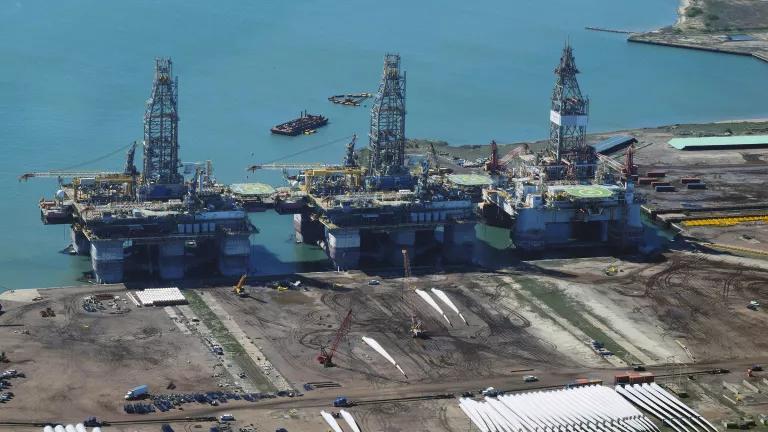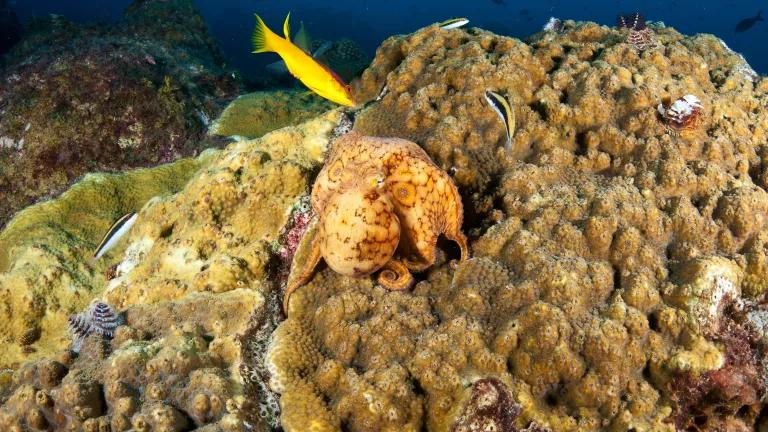Industry Bids on 1.7 Million Acres for New Offshore Drilling
BOEM's offshore oil and gas lease sale offered nearly 73 million acres in the Gulf of Mexico to the fossil fuel industry.

Offshore drilling rigs in Port Aransas, Texas
Ted Auch, FracTracker Alliance, 2019. Aerial support provided by LightHawk. CC BY-NC-ND 2.0 DEED.
The oil and gas industry submitted bids totaling $441 million for the rights to lease 1.7 million acres of the Gulf of Mexico—an area larger than the state of Delaware—during offshore Lease Sale 261. New offshore leasing today means that drilling is likely to continue in the Gulf for decades to come, along with its devastating effects on our climate, Gulf communities, coastal and ocean ecosystems, and the critically endangered Rice’s whale.
Lease Sale 261 offered 72.7 million acres in the western and central Gulf for lease, including the habitat of Rice’s whale, which consists of a narrow stretch of water running across the Gulf from Florida to Texas. Rice’s whales are among the most endangered marine mammal species on the planet, with under 100 individuals currently remaining. These whales live exclusively in the Gulf of Mexico, where they face a barrage of threats from oil and gas activities, including deadly vessel strikes, ear-splitting noise from seismic airguns and speeding ships, and the ever-present risk of oil spills.
Earlier this year, BOEM established important new measures to protect Rice’s whales from oil and gas activities as part of the planning process for Lease Sale 261. Crucially, the agency decided not to offer any new leases for sale in Rice’s whale habitat. This protection is consistent with the National Marine Fisheries Service (NMFS)’s recognition that the habitat area is essential to the whale’s survival. BOEM also established a requirement that new lessees follow a 10-knot vessel speed limit when traveling through the habitat area. Vessel collisions can kill or seriously injury Rice’s whales and pose a significant threat to the species’ survival. Requiring vessels to travel at a slower speed reduces the risk of collision.
However, opposing any barrier to their unchecked exploitation of public waters for corporate profit, the oil and gas industry sued BOEM in August to prevent the agency from establishing limits on leasing to protect the Rice’s whale. They succeeded. A federal district court in Louisiana required BOEM to include Rice’s whale habitat in Lease Sale 261 and eliminate the new protective measures for leases awarded from this sale. The Fifth Circuit Court of Appeals agreed with the district court and affirmed its decision.
BOEM’s efforts to protect Rice’s whales would have made a real difference, if they hadn’t been blocked. Based on the lease sale results released by BOEM, companies submitted bids for leases on multiple blocks inside the whale’s habitat, making future drilling likely in those locations. In addition, most of the bids were submitted for leases that will be located on the far side of the whale’s habitat. Because Rice’s whale habitat extends across the Gulf, vessels will have to go directly through the habitat area when travelling from the shore to leased areas. Establishing a speed limit would have reduced the risk of future vessel strikes, which can have deadly consequences for Rice’s whales.
Lease Sale 261 was the second offshore oil and gas lease sale held this year, following a March sale that offered roughly the same 73 million acres of the Gulf of Mexico for leasing. Although BOEM usually has discretion over whether to hold offshore lease sales, a provision of the Inflation Reduction Act (IRA) required the agency to hold both sales in 2023. This provision was included in IRA as part of a compromise to ensure the passage of IRA’s landmark investments to address climate change. IRA also linked oil and gas leasing to renewable offshore wind energy, which is a necessary tool in the country’s efforts to eliminate climate-polluting greenhouse gas emissions. Through 2032, IRA allows BOEM to issue offshore wind leases only if the agency has held at least one large offshore oil and gas lease sale in the past year.
NRDC, along with other environmental groups, has challenged Lease Sale 261 in court on the grounds that BOEM’s legally-required review of the environmental impacts of the sale was inadequate.
The fossil fuel industry already holds leases to 12.1 million acres of federal waters. Enough is enough. We must end new offshore leasing to ensure a livable climate, advance justice for frontline communities, and protect ocean wildlife and ecosystems.


